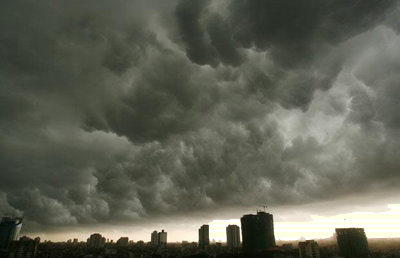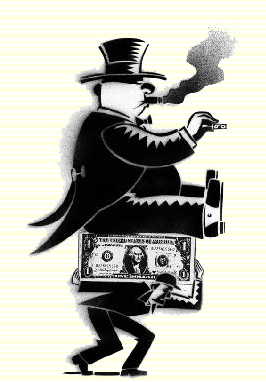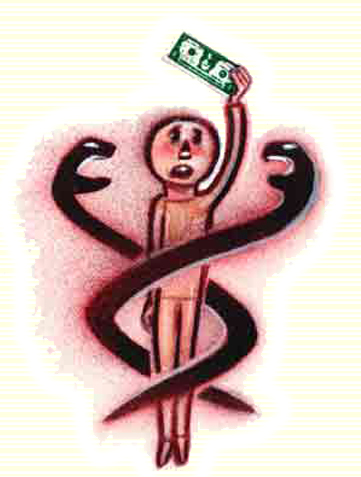 The year 2008 bore my mark as the year the system broke. A public article addressed the issues, laid out before the breakdown occurred in September of that year. The consequences for the many failures, the desperate nationalizations, the hasty scrambles to put financial sewage under USGovt ownership, the realization of TARP as a vast slush fund for illegitimate bank rescues, the official monetization plans put forth to prevent bond implosions, and much more occurred in the year 2009 as a recognized aftermath. Here we are in 2010 and the threats must again be laid out. A prelude was offered in an mid-December article entitled " Full Circle of Govt Debt Default" (CLICK HERE) where a global sovereign debt ruin in vicious circle was displayed the sequence that started in the Untied States and will end in the Untied States. Rather than make specific forecasts of extreme events, a list is presented much like a smorgasbord. The odds are 100:1 in favor at least one extreme event occurring in this current calendar year in my view. The odds are very high in favor of several events taking place this year. The key here is that a great many extremely damaging and highly disruptive events loom like giant gathering storm clouds that meet, complete with lightning displays. More terrestrial types might consider that a great many land mine explosives lie in the wide pathways ahead. At least a few extreme craters will be formed. A few financial edifices will be toppled. Great changes come, especially to the global power structures. This time around, the stakes are bigger, and entire nations will face debt failure and national realignment. The ripple effects will reshape the global financial system.
The year 2008 bore my mark as the year the system broke. A public article addressed the issues, laid out before the breakdown occurred in September of that year. The consequences for the many failures, the desperate nationalizations, the hasty scrambles to put financial sewage under USGovt ownership, the realization of TARP as a vast slush fund for illegitimate bank rescues, the official monetization plans put forth to prevent bond implosions, and much more occurred in the year 2009 as a recognized aftermath. Here we are in 2010 and the threats must again be laid out. A prelude was offered in an mid-December article entitled " Full Circle of Govt Debt Default" (CLICK HERE) where a global sovereign debt ruin in vicious circle was displayed the sequence that started in the Untied States and will end in the Untied States. Rather than make specific forecasts of extreme events, a list is presented much like a smorgasbord. The odds are 100:1 in favor at least one extreme event occurring in this current calendar year in my view. The odds are very high in favor of several events taking place this year. The key here is that a great many extremely damaging and highly disruptive events loom like giant gathering storm clouds that meet, complete with lightning displays. More terrestrial types might consider that a great many land mine explosives lie in the wide pathways ahead. At least a few extreme craters will be formed. A few financial edifices will be toppled. Great changes come, especially to the global power structures. This time around, the stakes are bigger, and entire nations will face debt failure and national realignment. The ripple effects will reshape the global financial system.
The blind, the deficient, and the compromised fail to fully appreciate and detect the meaning of the
There is no shred of the capitalist structural makeup remotely evident outside of Asia. We see cronyism systems in the West, but worse, we see syndicate systems with alleged cords of criminality. The discredit of the central bank franchise system is barely noticed by the mainstream, which applauds the printing press monetary operators without recognition of the repeat of Weimar chapters. Just today, the New York Times formally posed the question of how the US Federal Reserve can prevent the next asset bubble when it missed the last one. It actually misses all asset bubbles, creates them all, and denies the existence of each during formation. The signature signals of a failed central bank is a lasting 0% rate and heavy monetization, called euphemistically Quantitative Easing so as to make economist failure sound like some wondrous medical prescription in high falluting nomenclature. How about the US Financial Reform being called Economicus Moribundus and the vast printing of money in monetary policy being called Whisky Delugius?
Let's review a rather lengthy list of potential events. These are not wild raving pronouncements. Each has some critical mass of likelihood. Each event is presented like an ugly perverse budding shoot on the charred landscape, easily representing an element of the Paradigm Shift. The global shift is almost totally missed by the American leaders, the press networks, and the people. My interpretation is that they live inside the US Dome of Perception, and hardly ever pay attention to matters pertaining to the USDollar. They instead regard it as a constant factor, quite erroneously. The list to follow includes matters often considered sacred, due to the sanctity and inertness of sovereign governments and their debt. The event closest to the Untied States is the dreadful dismemberment of Mexico, which is Greece on steroids and cocaine with the temperature turned up and the violence turned up, where the law enforcement and military have both been compromised and infiltrated. It is a tight race between the US and Mexico as to which nation is more overrun by crime syndicates. The difference is the US has white collar crime, while Mexico violent crime.
The following events are presented as potential disasters looming, spanning the full spectrum, each with triggers in numerous arenas. These are potential disasters, not presented as forecasts, but rather as a list to beware for nasty highly disruptive eruptions. They are loaded with a geopolitical streak, in keeping with Paradigm Shift that signifies a powerful set of changes in altered power. The one common trait all the following potential events have is that they are systemic game change agents. The globe will be reshaped by each and every event that comes to pass. They are not listed in any order of likelihood, since they are all very much at risk of occurrence, and integrally interconnected to a frightening degree. Each would heap tremendous damage, disruption, and devastation, upon occurrence. One should note that if one or two events occur, then others might occur with domino effect from the chain reaction of chaos and opportunity. Note for instance, how the Dubai default resulted in Greek Govt debt downgrade, with no connection except possibly some ancient Greek statues in marble lined parlors in Dubai edifices. The ripple effects will be felt for a full year, just like Lehman, Fannie Mae, and AIG in the United States, just like Northern Rock, Royal Bank of Scotland, and Lloyds in England. The triggers have been ignited, and constant fallout comes. The process never stopped, only the perception that it had stopped. The process can only stop when liquidation and reform occur. Neither is remotely evident.
Use the following scale for grading risk and effect. The likelihood of the event happening will be shown as a percentage, with 0% the lowest and 100% a certainty. The impact for each and every stated event would indeed be huge, extreme, and dangerous. Many different sources have provided lists of extreme events for the new current year, a tradition. Much lies in common for those who choose to think ahead, instead of employing the common practice of putting a new less credible layer of deception on the current landscape. The best among all the sources seen in my view has been the Business Insider. Thanks to my own circle of colleagues and confidants, who provided at least a couple of events listed.
EXTREME WARNINGS FOR EXTREME TIMES
Saudi Royals fall
The Saudi Arabian royal family would lose government control to the Islamic Fundamentalists and is replaced. Scores of old royals escape loaded with hundreds of billion$ in assets, conjuring up memories of the Shah of Iran. Disruptions and instability spread across the entire Persian Gulf. A clampdown of fundamentalist groups in other Gulf nations invites backlash. Occupation forces in Iraq face renewed resistance. (chance: 20%)
China gains full naval military capability
The Chinese Military would attain aircraft carrier force with three carrier groups. In expert circles they call it blue water capability. With this potential, including long range strike potential, the balance of power in Asia is altered. Pressures are put as a result toward changed alliances in key nations considered loyal to the West. Certain strategic points gain attention, as focus is trained on the Mallacan Straits, the Panama Canal, the Suez Canal, the Bosporus Straits, the access routes to the Bering Sea, Australia, and South America. (chance: 30%)
Russian cuts off natural gas to Eastern Europe
Russia would enter a deep dispute with Eastern European nations, in particular Ukraine, and cuts off the flow of natural gas. Disputes center on return to the Russian fold from the independent factions encouraged by the Untied States motivated by the many Color Revolutions. Caught in the middle, at the end of the distribution lines, is Central Europe, whose ties forged by Germany to Russia remain healthy and strong. Russia later forges an alliance with Central Europe that results in some stability, as it becomes clear that Russia has come of age as a peacemaker with further ramifications in time. (chance: 50%)
Greece defaults on its debt
Great problems would result for the parent European Union, sure to fracture. Germany lets it go, does not cover the Greek debt, but employs plausible deniability on minimal offered assistance. A chain reaction begins, to reach the other vulnerable nations. Portugal, Italy, and Spain teeter upon the event, soon to suffer their own defaults, none aided. Even France suffers the ignominy of default, but is aided by Germany in the end, unlike the PIGS nations. The crux of the matter is refinance rollover of debt, which fails. The non-German EuroBonds then rise in yields, enough to force a split in the Euro currency to form the Nordic Core Euro. Default nations revert to their old former currencies and suffer massive devaluations. (chance: 80%)
Mexico fails as a state
The conditions in Mexico would become fully recognized and openly discussed. Two factors are front & center. The rise of the drug cartels in their control of the nation in numerous aspects is already global news. The unexpected net import of crude oil that ruins the nation's federal finances is not yet global news. The former has been understood, but the loss of oil exports takes the region by total surprise. Hyper-inflation then hits Mexico, which prints money to alleviate the federal budget shortfall. Chaos results on numerous levels. Supply disruption hits the US southern refineries. (chance: 70%)
Credit crisis relapse hits the US banks
The Untied States would suffer a relapse into a second round of bank failures, debt defaults, institutional liquidations, corporate deaths, and market disruptions. The proximal cause is the spread and continuation of the property decline, home foreclosures, and commercial defaults. Numerous bank analysts continue to harp on commercial mortgage loss risk after a 40% price decline, so far covered up by phony accounting rules. Impaired assets sit as bank assets. A trigger is the USFed removal from mortgage bond support, coupled with a powerful second downwave in housing prices from Option ARMortgages. A solution is put forth for wide USGovt purchase of housing inventory and the official advent of Fannie Mae as landlord. The supply chain is disrupted in extreme ways, as commercial paper grinds to a halt, and a deeper recession takes root. (chance: 40%)
The US supply chain suddenly suffers disruptions
The economic supply chain would be crippled by its two primary points of vulnerability. The finance credit lines are tied to wounded commercial paper markets. The actual tangible output supply comes from industries that struggle in credit flow, unstable prices, burdensome regulations, worker shortages, and constricted metal supply. Certain trucking firms have already shut down. Gasoline refineries are below their 1990 capacity. Mexican oil supply is soon to end. The lack of trained skilled experienced workers is chronic. (chance: 40%)
Fannie Mae is revealed as a slush fund, toxic bond haven, and object of grand criminal fraud coverup
Leaks would lead to calls for further Congressional investigations of mortgage bond fraud and past presidential pilferage. At the same time, various alerts would be given that the USGovt is harboring a black hole certain to cost over $2 trillion in additional bailouts, maybe up to $4 trillion. The prospect of wide USGovt home ownership from default sparks research reports and great scrunity, even clamor by younger members of Congress. The unlimited credit line to back USAgency debt securities has opened the door to a nasty effect on perception of USTreasury debt, as global perception of the actual USGovt debt ramps up 50%. Discussion of default rises. (chance: 40%)
The real 911 story comes out
The full seamy story would be revealed with many participants named. No further comment except that nation then would become deeply divided in reaction, and international isolation would result. The beneficiaries become the object of scrunity, criticism, and investigation. Attention turns to the swine flu vaccination and global Cap & Trade green taxes, each of which faces the harsh eye of investigation in Europe. (chance: 20%)
Iran is attacked
Great controversy would result from the direct attack of its nuclear facilities and other targets. Controversy would stir from scattered unconfirmed reports of involvement by various nations. Retaliation by Russia and China, long promised, then comes in hidden ways not fully understood. In the aftermath, the banks in the Mideast region are subjected to great scrutiny by several global players, especially one US ally nation. (chance: 10%)
Japan suffers a financial & economic crisis
A recession would take grip, spreading to its financial markets. Reduced export trade eliminated the trade surplus long ago. The Japanese Govt Bond then jumps higher by 2% or 3% in bond yield. The rising Yen currency consequently runs up 20% to 30% from the reverse of the Yen Carry Trade. Their export trade grinds to a near halt, and major conglomerate banks announce insolvency. Then China steps in. (chance: 40%)
UKGovt suffers a debt downgrade
The United Kingdom would be the first major industrialized nation to lose its high credit rating. The UKGilt bond yields then rise above 6% without pause. The threat of sovereign debt default is debated. The British Pound currency falls, which perversely aids the USDollar. Shock waves extend to the Wall Street financial center. Later, scrutiny comes to the USTreasury for its own downgrade and default risk. (chance: 50%)
Talk swirls for eliminating some central banks
Debate would focus on the central bank role as cause for asset bubbles, and extensions to the faulty nature of money itself. Analysts would cite money free from anchors of asset backing. However, awareness rises of the impracticality of central bank elimination, since debt liquidation and cleared decks cannot occur without global depression. In the background is rampant discussion of syndicate involvement and the risks of retaliation by the secretive banker organizations. (chance: 10%)
China faces a degree of chaos
Falling export trade, faltering bank reserves, empty commercial buildings, rising unemployment, idle factories, stalled construction projects, and restive population would contribute to a national crisis that struggles to be told amidst press controls. Armed with a $2500 billion war chest of reserves, China begins to convert assets into tangible rescues, aid, and welfare. The Chinese crisis then ignites a global sale of USTreasurys. As an offshoot to the chaos, the colonization of America then begins, as China cashes in on its USAgency Mortgage Bonds. It exploits it cut deal of Eminent Domain conversion of bonds into property. (chance: 20%)
Food prices soar in the US
The divergence between official crop forecasts would clash with the reality of crop failures and profound shortages this summer. Being the greatest food production source, the US crisis spreads globally. The deCarbonnel threat is realized, as foreign nations sell US$-based assets in order to finance food supply purchases. China enters the fray as a buyer of distressed farm property, amidst accusations of carpetbagger. (chance: 80%)
JPMorgan is object of persistent rumors of gigantic credit derivative losses
The slowly rising USTreasury Bond long-term yield would cause deep painful losses to JPMorgan. Their abuse of Interest Rate Swap contracts becomes a topic of debate. The monetization of USTreasurys becomes a topic of debate. The ability for the USGovt to control its deficits and auxiliary (hidden) losses becomes a topic of debate. Even bond fraud within JPM hallowed halls becomes a topic of debate. To cover the losses, monetary inflation grows out of control, and a USDollar decline ensues, taking the DX dollar index below the 70 level. (chance: 40%)
London metals exchange shuts down
The venerable London Bullion Market Assn would close, unable to fulfill gold orders. The varied stories continue regarding unorthodox practices from the London metals exchange in the month of December, like redemption of gold contracts in cash, like outsized demands for gold delivery mainly by Chinese entities but increasingly by the Swiss, like satisfaction of gold contracts with Street Tracks GLD shares, and much more. Scrutiny with assays upon high volume delivery have been standard since the tungsten gold story emerged, an indirect confirmation often ignored. The supply chain with intermediaries suddenly halts, as they too have no gold bullion to supply the LBMA. Companies shut down. Lawsuits result. Prosecutions begin. Midlevel officials are arrested. Some turn state's evidence. The gold price enters a state of extreme confusion, with vast discrepancies between paper gold price and physical gold price. (chance: 70%)
Gold and Silver Start a New Year
Like after a stormy night, the new year has arrived much like a new market with fresh perspectives. The end of tax loss selling, accompanied by tax gain offsets, has come. The beneficial effect is equally shared between gold and silver, although the percentage gain from the recent reversals this week is larger for silver. Not shown in the two graphs is the upward jump in today's prices. They extended gains, with gold reaching the 1135 level, and silver reaching the 18.1 level. The most important factors to keep in clear focus are why gold is rising in a powerful upward trend in the first place. They have not changed. There is no end in government spending, from the Untied States, the UK, Europe, and Japan. There is no meaningful reform of any kind, surely no remedy unless one considers padding banker balance sheets with taxpayer funds as pre-requisite for remedy. There is only a rampant rabid race to grow the money supply, to produce federal deficits, to expand the central bank balance sheets. The real adjusted cost of money is negative after price inflation. The 0% official rates have become fixtures, as central banks look increasingly incompetent in justifying their continuation.

Notice the sharp reversals since the new January month began. Long-term moving averages remain in the uptrend, despite the orchestrated December correction. Investment demand is skyrocketing, a story barely told in the Western press. The wide band for the silver price hints of a strong price rise toward the 20 level on the next upswing. It has already begun. The tumultuous 2010 year, identified by at least a few key critical events listed above, will send the gold & silver prices soaring. Those who believe the hype in the previous month by the mainstream biased press will regret not climbing aboard. This will be the year of magnificent crises that change the face of the global financial structures. Debt will be dumped like a broken Vegas gambler. Paper money will be discarded like yesterday's newspaper. With the crude oil price at almost $83 per barrel, where are the Deflation Knuckleheads now? They led some gold investors to exit before the push from $900 to $1200. They remain legends only to the image in their own mirrors. The crude oil price might actually come down somewhat in the coming month or two, from scads of vessels loaded and sitting at sea. But gold & silver are set to continue a powerful upward thrust in price, as the perversion of money has become a desperate broad global pursuit. Most major currencies face serious debasement. This is a great opportunity to join the Precious Metals Locomotive after a pit stop. Targets are gold at $1375 and silver at $22.25 per ounce.

home: Golden Jackass website
subscribe: Hat Trick Letter
Jim Willie CB, editor of the “HAT TRICK LETTERâ€
Use the above link to subscribe to the paid research reports, which include coverage of several smallcap companies positioned to rise during the ongoing panicky attempt to sustain an unsustainable system burdened by numerous imbalances aggravated by global village forces. An historically unprecedented mess has been created by compromised central bankers and inept economic advisors, whose interference has irreversibly altered and damaged the world financial system, urgently pushed after the removed anchor of money to gold. Analysis features Gold, Crude Oil, USDollar, Treasury bonds, and inter-market dynamics with the US Economy and US Federal Reserve monetary policy.
Jim Willie CB is a statistical analyst in marketing research and retail forecasting. He holds a PhD in Statistics. His career has stretched over 25 years. He aspires to thrive in the financial editor world, unencumbered by the limitations of economic credentials. Visit his free website to find articles from topflight authors at www.GoldenJackass.com . For personal questions about subscriptions, contact him at JimWillieCB@aol.com
 Matt Taibbi's reaction to the ZeroHedge story with regard to Turbo Tim's lifting of the government support on Christmas Eve for the GSE's was exactly my own. You can read it in its entirety
Matt Taibbi's reaction to the ZeroHedge story with regard to Turbo Tim's lifting of the government support on Christmas Eve for the GSE's was exactly my own. You can read it in its entirety  The abyss is widening, many have already fallen in. The Fat Boys at Goldman say they are doing God's work, do they really believe that. Maybe they know dark secrets we are not privy to. What does God's work entail? Stopping fear and panic? Holding up asset prices and presenting the illusion of a stable, recovering economy? If they fail, then hell will follow.
The abyss is widening, many have already fallen in. The Fat Boys at Goldman say they are doing God's work, do they really believe that. Maybe they know dark secrets we are not privy to. What does God's work entail? Stopping fear and panic? Holding up asset prices and presenting the illusion of a stable, recovering economy? If they fail, then hell will follow. 
 As a general rule,
As a general rule, 










